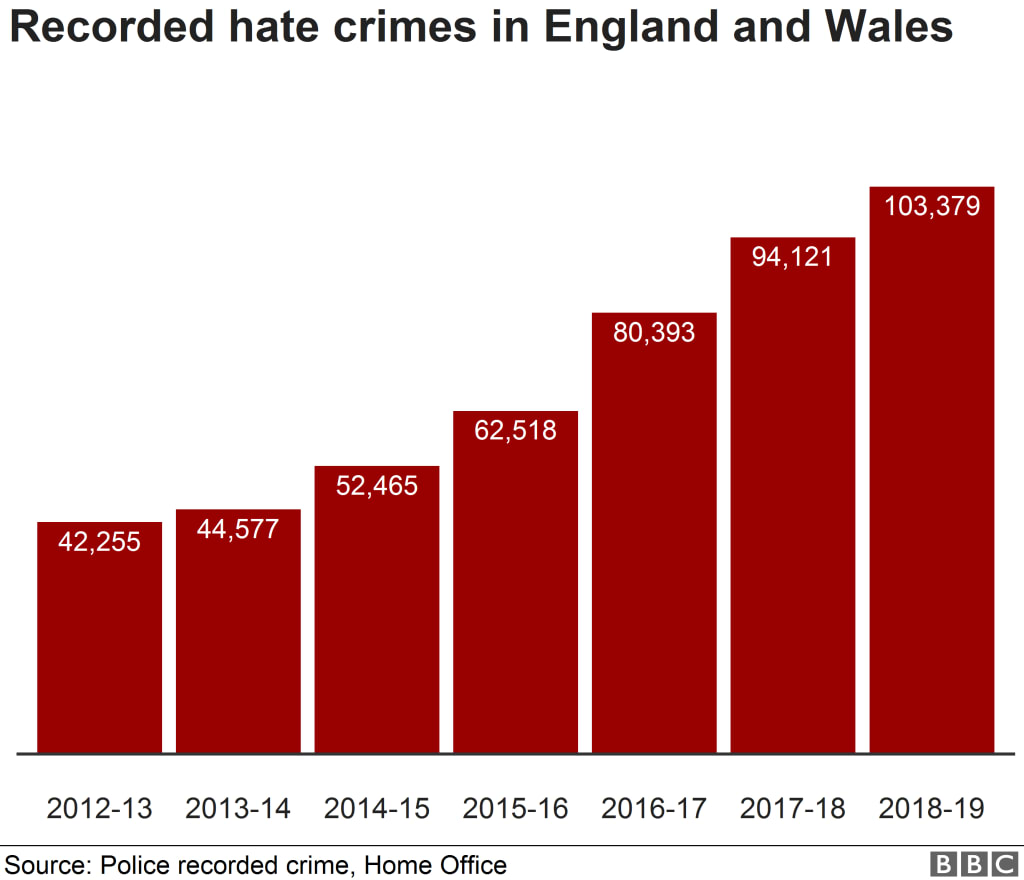
UK police recorded over a hundred thousand incidents of hate crime in the country last year. This was 8% higher than the previous year and illustrate an extremely worrying trend that racism and other forms of discrimination are on the rise. This could be due to a number of reasons including the Brexit vote. Now that the UK has left the European Union, tougher boarder controls have been put in place as the UK has regained control of who can come in to the country.
A survey has shown that 71% of ethnic minorities have faced some sort of racism since the UK left the European Union. This is up from 58% and shows an extremely worrying trend that racism is dramatically rising and people should be on their guard at all times for such incidents.
The data comes amid rising concern at the use of divisive rhetoric in public before this week’s European parliament elections, where some leading candidates, including Ukip’s Carl Benjamin and the independent Tommy Robinson, have records of overt racism.
A hate crime is a crime committed against someone because they are different in some way from other members of the population. People may be targeted on the basis of their race, religeon, disability, sexual orientation or transgender identity.
Any crime can be prosecuted as a hate crime if the offender has either:
demonstrated hostility based on race, religion, disability, sexual orientation or transgender identity
Or
been motivated by hostility based on race, religion, disability, sexual orientation or transgender identity
This week, 9th-16th October 2021 is Hate Crime Awareness Week and people are being encouraged to get involved and spread a message of love not hate.
Stop Hate UK is one of the countries leading organisations who are working to challenge all forms of hate crime and discrimination.
In September 2009, Ian Baynham was homophobically abused and beaten unconscious in Trafalgar Square. After two weeks in a coma he died from the injuries he sustain. His death inspired the first London Vigil Against Hate Crime which was held on the 30th October 2009.
It was one of the first events of its kind to go viral across social media, over 29,000 people shared the event on Facebook and over 10,000 people attended the first vigil in Trafalgar Square.
The London Vigils took place between 2009 to 2012, whilst other vigils took place in Brighton, Kettering, Milton Keynes and Norwich, amongst others around the UK.
In 2012 the London Vigils evolved into National Hate Crime Awareness Week #NationalHCAW.
Each year our volunteers;
Organise the national week across the UK.
Write to key figures across the social and political spectrum encouraging their participation.
Create and distribute resources to promote the week.
Use our social media to spread a national message of H.O.P.E.
Organise a service of Hope and Remembrance in St Paul’s Cathedral, London.
Register events and promote them on our NationalHCAW Google Maps.
Work in partnership with the authorities, key partners and communities affected by hate.
Conduct local, regional and national hate crime related research.
As part of Stop Hate UK’s campaign to improving awareness of the issues associated with hate crime, people are being encouraged to go to their web site to download their banner and other images to add to their own web sites and social media profiles to draw more attention to the issues and circumstances that people may experience if they are victims of hate crime. A number of different items of clothing and other garments have been produced with the stop Hate UK logo on to draw attention to the plight people experience and know who to contact if they ever witness such incidents when they are out in public.